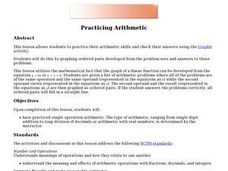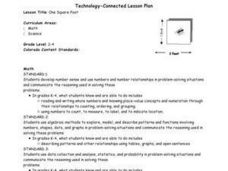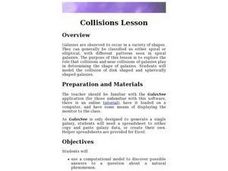Curated OER
Free Printables: Handwriting 2
In this drawing worksheet, students copy a number of shapes and then practice drawing the shape in the box provided at the bottom of the worksheet.
Curated OER
Graphs and Functions
Students are introduced to plotting functions on the Cartesian coordinate plane seen several categories of functions, including lines and parabolas
Curated OER
Creating A Family Tree
Fourth graders explore their ancestral background while they experience genealogy.
Curated OER
Practicing Arithmetic
Students practice single operation arithmetic ranging from single digit addition to long division of decimals or real numbers using Graphit. They use data sets and rules to graph ordered pairs.
Curated OER
Mathematical Models with Applications: What's Your Rate of Change?
Students use regression methods available through technology to select the most appropriate model to describe collected data and use the model to interpret information. They use numeric techniques to write the equation of a line that...
Pennsylvania Department of Education
Creating Polygons
Pupils describe, make and compare polygons. In this creating polygons lesson, students identify properties of quadrilaterals and describe common features of two dimensional shapes.
Curated OER
One Square Foot
Students identify, describe, count, tally, and graph life found in one square foot of land.
Curated OER
Cancer City USA
Students investigate a phenomenon known as the cancer cluster. Students determine potential cancer clusters given real data and support their findings using mathematical calculations. Students Create a graphical representation of the...
Curated OER
Basic Crypto Systems
Students try to solve codes mathematically. The use of a code needs a key. Students try to decipher a code with a mathematical key. This requires focus and higher order thinking skills like analysis.
Curated OER
Track's Slippery Slope
Middle schoolers graph data of sports figure running time using x-axis y-axis to find slope of trend line, mathematically find the interpolated and extrapolated values for data points. Using the information they make predictions.
Curated OER
Calculating Range for a Constant Velocity
Students read an explanation from the NASA Web-based "textbook", The Beginner's Guide to Aerodynamics, then use the information in combination with data from other Web sites to solve single variable equations for distance (range), time,...
Curated OER
Walk a Mile in Albatross Shoes
Students recognize the correlation between the trash they dispose of around their school and the environmental hazards that face wildlife, specifically the Laysan albatross. They determine three ways that they can help the albatross chicks.
Curated OER
A Game of Chance
Students explore probability through cooperative group activities and interactive video technique.
Curated OER
Representing the Unknown
Second graders solve number sentences and examine how to apply basic operations of mathematics to those problems. They also use symbols to represent unknown numbers and how they are used in equations.
Curated OER
Grade 2: Texas Problem Solving
Second graders use numerical data about Texas to write and solve real-life problems involving addition and subtraction (or multiplication and division). They work in pairs to choose three numerical facts about Texas to use to make up...
Curated OER
Matching Pairs
Learners take turns matching the appropriate shapes (listing coin values) to those with numerical values listed on them. When students are successful, they win a blank shape for their collection.
Curated OER
Are You Money Smart?
Learners figure out and discuss the irony of this coin-centric poem. They also practice persuasive letter writing, and identify and count coin/money values.
Curated OER
Review for the Algebra One SOLs
Students review the standards for Algebra I. Using the text, they discover two problems that match each standard and solve them showing all steps on paper. They create a PowerPoint slide for each problem and go through the correct...
Curated OER
Modeling Population Growth
Learners investigate the reasons for taking a census and determine the problems that are involved in the process. They examine the population figure for Montana and Lake county before using the information to complete the included...
Curated OER
How Does Your Garden Grow?
Students create a design for a school garden. In this garden design lesson plan, students analyze what plants grow best in their school's climate and work in teams to design a garden. Students measure the existing space, determine the...
Curated OER
Impossible Graphs
Students distinguish between possible and impossible graphs of functions, and to learn why some graphs are impossible. They have practiced plotting functions on the Cartesian coordinate plane
Curated OER
Collisions Lesson
Tenth graders explore the role that collisions and near collisions of galaxies play in determining the shape of galaxies. They model the collision of disk shaped and spherically shaped galaxies.
Curated OER
Confusing Colors!
Fourth graders collect data, graph their data, and then make predictions based upon their findings. They's interest is maintained by the interesting way the data is collected. The data collection experiment is from the psychology work of...

























